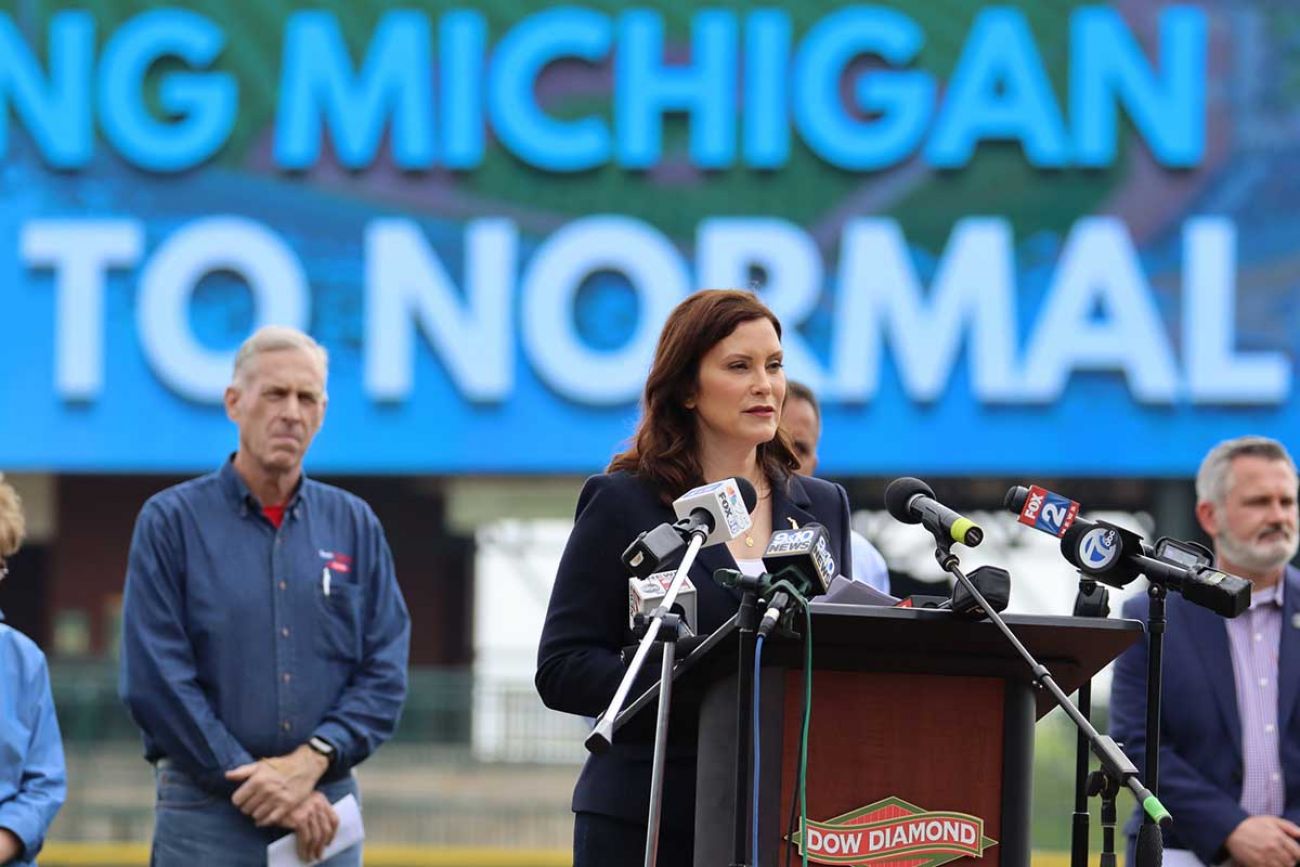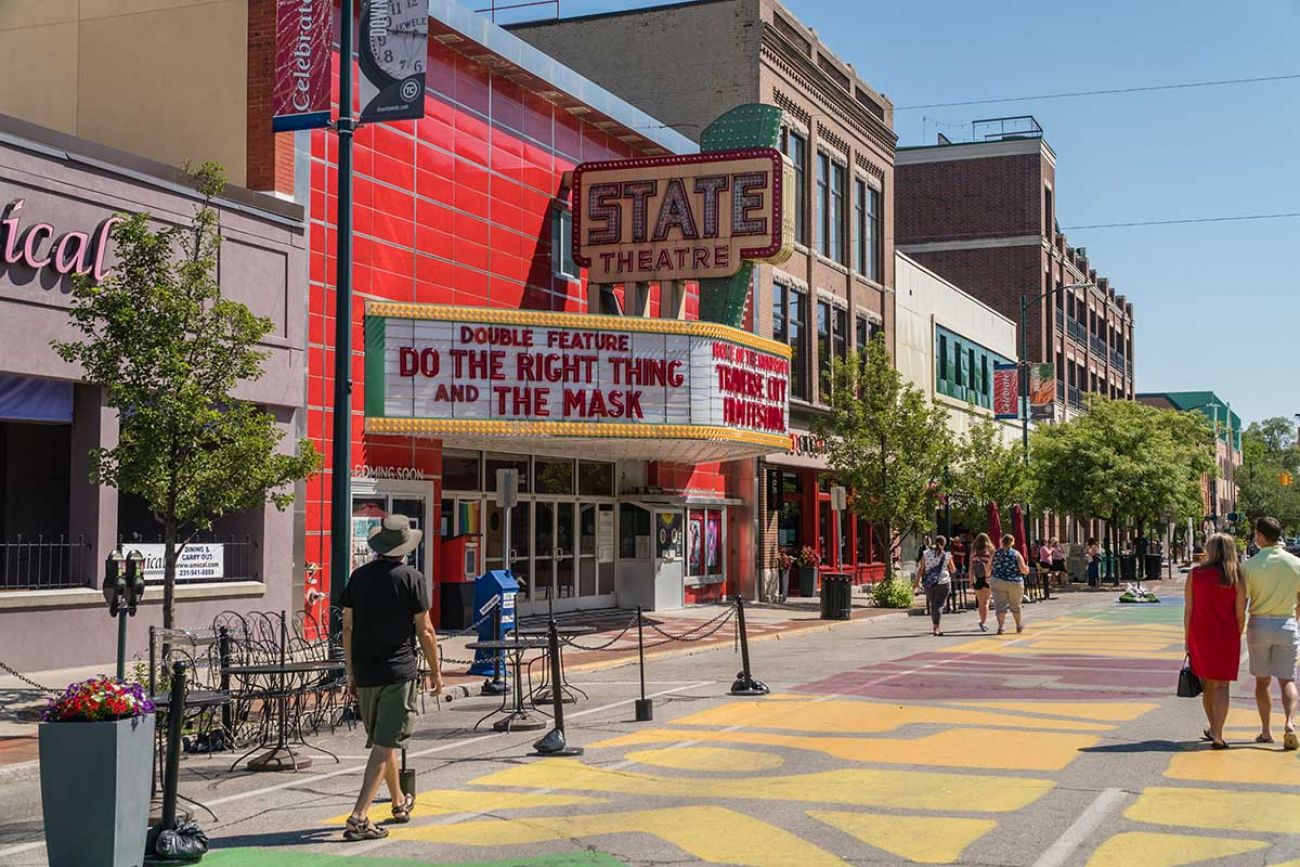‘A really good day for business’ as Michigan acts to lift COVID limits

July 27: CDC recommends indoor mask use. But don’t expect mandates in Michigan
June 22: Michigan drops COVID-19 safety restrictions in most workplaces
June 21: Michigan’s mask and capacity restrictions end Tuesday. What you need to know.
Changes moved quickly Thursday for businesses across Michigan, as Gov. Gretchen Whitmer set an accelerated timetable for removing remaining COVID-19 restrictions.
Hours after her morning announcement, her administration also agreed to drop plans to make pandemic workplace rules permanent, a move that business advocacy groups across the state had criticized.
Combined, the steps signal a chance for the state’s business community — particularly struggling sectors like bars, restaurants and event facilities — to more fully focus on an economic recovery, advocates said.
“Today was a really good day for businesses,” said Sandy Baruah, president and CEO of the Detroit Regional Chamber of Commerce.
Related:
- Questions, answers about Michigan’s changing COVID restrictions
- An end in sight? Michigan experts say COVID finally ‘winding down’
- Gov. Gretchen Whitmer: All COVID restrictions to end in Michigan on July 1
Brian Calley, president of the Small Business Association of Michigan, agreed.
“This is a huge day for small business owners everywhere,” he said in a statement. “We now have a date certain when capacity restrictions will be lifted (and) the prospect of permanent workplace rules is being pulled off the table.”
Whitmer said the state is dropping its “Vacc to Normal” benchmarks for reopening businesses based vaccination rates in favor of setting two key dates: On June 1, capacity limits will lift for outdoor events and indoor capacity limits will increase to 50 percent. Then, as of July 1, the state will no longer limit capacity at indoor or outdoor gatherings.
Under Whitmer’s Vacc to Normal program, which tied loosening restrictions to the state reaching vaccination levels up to 70 percent, many of the restrictions would likely not have been lifted until late summer or even fall, given the recent and dramatic falloff in residents willing to get vaccinated.
As business leaders were processing Whitmer’s announcement, another change was announced: Pandemic workplace restrictions enforced by the Michigan Occupational Safety and Health Administration will be updated on Monday, with plans to halt making those restrictions permanent.
The MIOSHA COVID rules were initiated “to keep employees safe if needed when the (state’s) emergency rules expired,” according to the state. “With rising vaccination rates and falling case numbers, along with the recent updates from the (U.S. Centers for Disease Control and Prevention), MIOSHA is confident that completing the normal rulemaking will not be necessary. “
Pandemic workplace rules — like health screening, social distance, surface cleaning and masks — were scheduled to be enforced through October 14. The state did not say how they will change the workplace plan when they meet Monday.
Halting the permanent implementation of MIOSHA COVID rules is a win for the hospitality industry, said Scott Ellis, executive director of the Michigan Licensed Beverage Association, due to the costs of complying and potential penalties.
“If these rules would have gone into effect, it would have been disastrous for business owners not only in the hospitality industry, but in all industries statewide.”
Now, Ellis added, he hopes to get the millions of dollars in pandemic relief that was line-item vetoed by the governor passed.
“Our industry still has a long way to go before we’re back in the black,” Ellis said. “We look forward to working with the governor’s administration and legislature to secure the funding and assistance that our industry desperately needs.”
About 57.2 percent of state residents 16 and older had gotten at least one dose of a COVID-19 vaccine as of Thursday morning, while Michigan’s new case count was 1,372, compared to close to 4,000 new daily cases weeks earlier.
“MIOSHA has a duty to protect Michigan workers and the agency’s emergency rules have provided employers and employees with the guidance and certainty they needed to stay safe,” Michigan COVID-19 Workplace Safety Director Sean Egan said in a statement. “The agency has the flexibility it needs to ensure consistency with public health guidelines to protect working people.”
With major changes to how the state will continue to regulate businesses amid COVID-19, owners spent part of Thursday trying to assess how they’d adapt.
For Doug Nie, the announcement means at least a couple of dozen families in the Ann Arbor and Ypsilanti areas will get calls from his staff at Nie Family Funeral Home soon, letting them know they’ll finally get to hold indoor funerals for their deceased loved ones. Some funerals were held in a tent in the funeral home’s parking lot during the pandemic. Others were able to take place in churches after the state lifted gathering restrictions in places of worship.
But for about 15 percent of the funeral home’s clients, grief has been deferred.
“A lot of families were missing the ability to share,” Nie said. “They couldn’t hug anybody.”
Lifting indoor event limits mean indoor funerals can be held without restriction as of July 1. While it’s a time for Nie to reconnect with clients, it’s also a time, he said, to restore profitability to yet another industry that suffered as COVID-19 prompted government capacity regulations.
Across industries, the changes signal the long-desired return to normal operations.
Bars and restaurants no longer will face an 11 p.m. curfew, or an indoor cap of 100 customers in larger venues. Casinos, gyms and other workout facilities will be able to double their allowed capacity, going to 50 percent by June 1.
And live performance venues no longer have to worry about whether a booking with limited seating will be financially viable.
Thursday’s changes impact major league sports, too. The Detroit Tigers said the team soon plans to launch ticket sales for June 1 and beyond, exclaiming on Twitter, “We can’t wait to celebrate with 41,083 of our closest friends!”
Yet for other annual events, the decision comes too late. The Ann Arbor Art Fairs were canceled last week; the Traverse City Film Festival was canceled for the second year in a row at the end of April. And the National Cherry Festival, held annually over the July 4 holiday in Traverse City, will look much different.
“We had to concede some of our most well-known events for a second year because the restrictions were too onerous a few months back,” said Trevor Tkach, president and CEO of Traverse City Tourism.

Tkach called the lifting of business restrictions “a light at the end of the tunnel” for the hospitality industry. That it came as northern Michigan readies for its second pandemic summer season means many businesses that were running out of savings have hope for the immediate future and beyond.
“We all would have hoped to have a clear vision of where the end would be,” he said of the events already canceled. “I just hope that the community and the rest of this great state understand that the decisions made (were) not in haste and they were made to protect the public.”
Baruah, of the Detroit Chamber, said navigating out of the pandemic may be as difficult for businesses as figuring out how to function in the early days of COVID-19. Businesses must still make their own decisions on what their policy will be on safety issues such as masks, which Whitmer’s announcement signaled is moving from a government decision to one based in each workplace.
Few of the chamber’s members from 11 counties in Southeast Michigan have made that decision, Baruah said.
“In most cases, there will not be one right or wrong answer,” Baruah said. Factors will range from their bottom line to the expectations of customers and their own workers.
“One of the unknowns is how much more progress and how quickly our progress will be toward vaccine rates, and that’s going to impact decision-making,” he said.
Restaurants face their own calculations. Being able to open at full capacity soon doesn’t mean a business will become profitable, said Gary Kosch, owner of seven restaurants and one catering facility in Northern Michigan.
Customer demand already is strong, and Kosch expects his properties in places like Traverse City and Gaylord to be booming soon. However, he has two concerns: How quickly people will be ready to return to larger events, and staffing.
“This isn’t going to be a switch that all of a sudden goes on,” Kosch said.
The Otsego Grand Event Center may do 250 events in a normal year, he said, including off-site weddings in nearby barns or on the beach. This year, he’s expecting about 75 events, with each averaging up to 50 percent fewer people.
If he could hire more staff, he’d be able to take on more business, Kosch said. That, he added, is the next issue for the industry to solve.
Still, he said, “there’s certainly going to be more opportunity than last year.”
Business Watch
Covering the intersection of business and policy, and informing Michigan employers and workers on the long road back from coronavirus.
- About Business Watch
- Subscribe
- Share tips and questions with Bridge Business Editor Paula Gardner
Thanks to our Business Watch sponsors.
Support Bridge's nonprofit civic journalism. Donate today.
See what new members are saying about why they donated to Bridge Michigan:
- “In order for this information to be accurate and unbiased it must be underwritten by its readers, not by special interests.” - Larry S.
- “Not many other media sources report on the topics Bridge does.” - Susan B.
- “Your journalism is outstanding and rare these days.” - Mark S.
If you want to ensure the future of nonpartisan, nonprofit Michigan journalism, please become a member today. You, too, will be asked why you donated and maybe we'll feature your quote next time!




